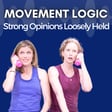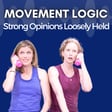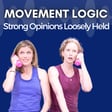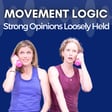
109: Hot Flashes, Cold Facts: Menopause Myths That Won’t Die
In this episode of the Movement Logic podcast, Sarah and Laurel take on the most persistent—and profitable—myths about menopause and women’s health. From metabolism myths to cortisol panic, creatine hype, and new exercise “rules”, they separate marketing spin from actual science.
They also unpack the nuanced role of menopausal hormone therapy (MHT)—who it helps, when it’s useful, and why menopause isn’t a medical emergency needing endless “fixes.”
Sign up for the Bone Density Course Interest list
Follow us @MovementLogicTutorials on Instagram
10:12 8 Menopause Myths and Misconceptions
37:08 Cortisol and Menopause
43:14 Exercise and Menopause
51:33 Muscle Loss and Menopause
55:00 Hormone Therapy and Muscle Mass: The Evidence
57:56 Debunking the Rapid Bone Loss Myth
01:04:31 The Truth About Creatine Supplementation
01:18:48 Menopause Symptoms vs. Aging: What's the Difference?
01:29:24 Menopause Hormone Therapy: Myths and Realities
01:42:25 Concluding Thoughts and Recommendations
Ep 8 A Perimenopause Perspective
63: Dismantling Long and Lean Pt 2
108: Does it Have to be Heavy?
Study Daily Energy Expenditure Through the Human Life Course
Study Changes in Physical Activity and Body Composition in Postmenopausal Women
Study Evaluation of sex-based differences in resistance exercise training-induced changes in muscle mass, strength, and physical performance
Study Changes in body composition and weight during the menopause transition
Study Association Between Hormone Therapy and Muscle Mass
Study Longitudinal changes in BMD during perimenopausal transition
Study BMD Changes During the Menopause Transition
Study Efficacy of Creatine Supplementation Combined with Resistance Training on Muscle Strength and Muscle Mass
Study Creatine Supplementation During Resistance Training Does Not Lead to Greater Bone Mineral Density



